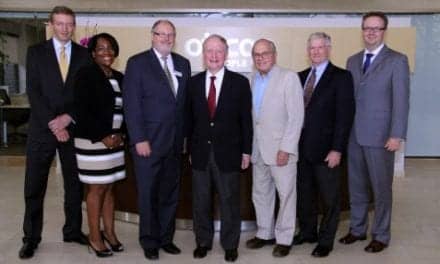In a surprise announcement, Demant says it has negotiated an agreement with the intention of divesting its Hearing Implants business, Oticon Medical—which includes the Ponto 5 bone-anchored hearing systems (BAHS) and Neuro cochlear implant (CI) systems—to Cochlear Limited for a total consideration of DKK 850 million (US$120 million). The transaction is subject to regulatory approvals and other closing conditions, and reportedly entails DKK 700 million paid in cash at closing, and DKK 150 million within 18 months after closing, anticipated in the second half of this year.
The transaction follows Demant’s review of strategic options for the business area, including how to ensure the best lifelong support of existing patients, which are estimated at about 75,000 recipients. As part of the transaction, Cochlear has committed to servicing existing patients of Oticon Medical now and in the future. Cochlear Ltd is estimated to account for more than half of worldwide cochlear implants sold, and as much as two-thirds of the BAHS market, while Oticon Medical accounts for a tiny percentage of the CI market but a much larger percentage of the BAHS market.
Related Article: Hearing Care M&As Heat Up Again
Demant reports that, since the establishment of its Hearing Implants business in 2007, the company has invested significantly in implantable solutions for the treatment of hearing loss, and Oticon Medical employees have worked tirelessly to bring industry-leading technology to thousands of patients, reaching many major milestones along the way. However, Demant has now concluded that the prospect of becoming a global leader in hearing implants is not achievable within a reasonable timeframe without disproportionate levels of investments and significant dilution of the Group’s profitability. In this light, Demant has made the decision to divest in hearing implants.
“Overcoming the challenges of hearing loss— and living with implant technology to alleviate this—is a lifelong journey, and we believe it is best for our patients to continue this journey with Cochlear,” said Demant President and CEO Søren Nielsen. “We will do everything in our power to ensure minimal implications of the intended divestment for customers and patients, as well as the employees of Oticon Medical, who have delivered beyond expectations and are some of the brightest minds in the industry.”
Cochlear CEO & President Dig Howitt stated: “We look forward to welcoming Oticon Medical’s entire base of implant customers and patients to the Cochlear family. Driven by our mission to innovate and deliver a lifetime of hearing outcomes, we will seek to ensure that Oticon Medical’s customers and patients continue to be supported with a lifetime of hearing solutions. We will work closely with Demant to ensure a seamless transition of the business to Cochlear to ensure continued access to current Oticon Medical technology for customers and patients in the coming years. We will develop next-generation sound processors and services that will enable customers to transition to and benefit from Cochlear’s technology platform over time. The acquisition of Oticon Medical will provide us with greater scale and will enable us to increase our investments in R&D and market growth activities.”
The announcement came as a surprise because Demant is not known for divesting in companies; instead, it is known more for buying and reviving businesses. Oticon Medical is estimated to make up about 6% of the Demant Group’s sales, but it has continued to lose money, representing a drain in returns on investment and lowering profitability in the eyes of investors. More recently, the Hearing Implant division also hit a rough patch. Although voluntary recalls are not extremely uncommon for implants where patient safety is always the foremost priority, Oticon Medical announced in October a voluntary field corrective action by recalling its non-implanted Neuro Zti cochlear implants and temporarily halting sales of their new CIs. Additionally, Jes Olsen, the president of Oticon Medical since its founding in 2008 and who had worked at Oticon since 1985, announced his retirement in January.
Demant reports that excluding Hearing Implants from the Group’s outlook for 2022 has a positive impact of around DKK 150 million (US$21 MM) on the Group’s expected EBIT for the full year. Consequently, the Group now expects EBIT of DKK 3,600-3,900 million (previously DKK 3,450-3,750 million). The impact on other outlook metrics is neutral.
The company reports the profit after tax of discontinued operations in 2022 is expected to be negative by around DKK 150-200 million ($21-28 million). This mostly reflects the expected operating loss in Hearing Implants, which may be further negatively impacted by the announced transaction in the period until closing, and also certain one-off items, such as the fair value adjustment of assets and liabilities that reflects the realized sales price and transaction costs. The net impact of the one-off items is expected to be roughly neutral, subject to adjustments for working capital and other items at closing.
There are no changes to the Group’s medium- to long-term outlook.
Source: Demant and HR







